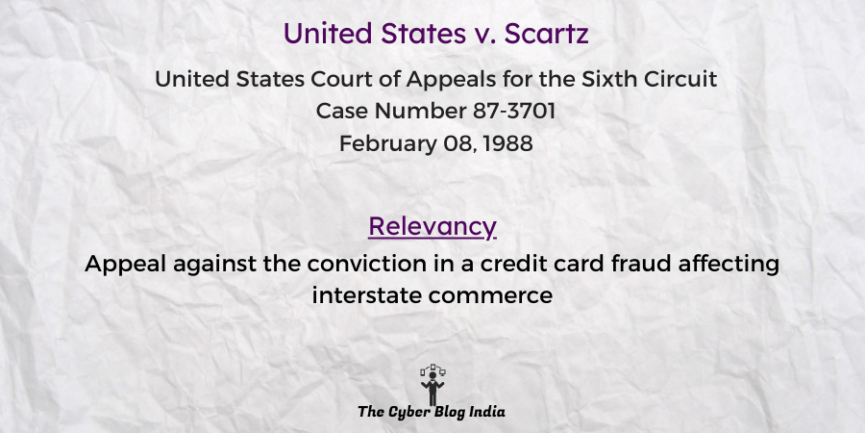United States v. Scartz

United States v. Scartz
838 F.2d 876
In the United States Court of Appeals for the Sixth Circuit
Case Number 87-3701
Before Circuit Judge Jones, Circuit Judge Wellford, and Circuit Judge Boggs
Decided on February 08, 1988
Relevancy of the Case: Appeal against the conviction in a credit card fraud affecting interstate commerce
Statutes and Provisions Involved
- The Violent Crime Control and Law Enforcement Act, 18 U.S.C. § 1029
- The Federal Rules of Evidence (Rule 801(d)(2)(E))
Relevant Facts of the Case
- Scartz was the principal business owner of Sports Periodicals, Ohio. The company sold sports information to people who telephoned or mailed orders to the company.
- Maloney, who had a business interest in Sports Periodicals, obtained merchant’s VISA and Master Card accounts through a bank in Indiana. This allowed the business to accept credit cards as a form of payment.
- In setting up this account, Maloney represented to the bank that the business would operate in Indianapolis. However, it never operated from that city.
- Upon applying the merchant’s account, Maloney obtained an imprinter, which a merchant uses to accept credit cards as payment.
- This particular imprinter was used solely at the Ohio headquarters. Counterfeit cards were run through the imprinter, resulting in approximately $7000 credited to Sports Periodicals.
- A federal grand jury indicted the appellant and three others with conspiracy to use counterfeit credit cards and fraudulently use credit cards.
- The appellant’s three co-defendants pleaded guilty, while Scartz pled not guilty and stood trial.
- The court found him guilty of conspiracy and a single substantive count of fraudulently using counterfeit cards. It sentenced him to three years imprisonment and consecutive five-year probation. It also ordered him to pay restitution and perform 100 hours of community service.
- The appellant has filed this appeal against his conviction by the trial court.
Prominent Arguments by the Counsels
- The appellant’s counsel argued that the government did not show sufficient evidence supporting his conviction for fraudulently using two counterfeit cards. The counsel claimed that his actions did not affect interstate commerce and, therefore, did not complete the offence because no one suffered a loss. He contended that the lower court used the wrong standard in determining the existence of a conspiracy and the appellant’s part in it. They argued that the lower court considered hearsay statements and used the “slight evidence standard” to determine whether Scartz was a part of the conspiracy.
- The prosecution’s counsel presented evidence that Scartz aided, abetted, assisted, facilitated, and directed one of the co-defendants to use two counterfeit cards.
Opinion of the Bench
- There was enough evidence to support the jury’s verdict in convicting him of fraudulently using two counterfeit cards.
- Since Scartz used banking channels to obtain authorisation to approve the charges on the cards, his actions affected interstate commerce. Also, the statutes do not require the government to prove an actual loss occurred.
- The district court did not abuse its discretion with regard to the actions the appellant claimed.
- In finding that a conspiracy existed and that the appellant was a part of it, the district court correctly cited and used the preponderance of the evidence standard. It was not even necessary to consider hearsay because the evidence was enough to deal with the issue.
- The “slight evidence” standard refers to the nature and extent of the member’s involvement in a conspiracy. It does not refer to the initial question of whether one is a member of such a group.
Final Decision
- The court affirmed the appellant’s conviction.
Anjali Agrawal, an undergraduate student at the NALSAR University of Law, prepared this case summary during her internship with The Cyber Blog India in May/June 2022.
